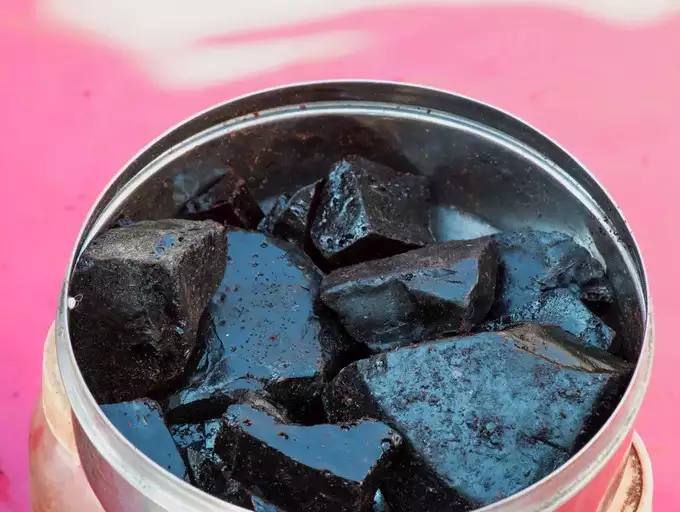Shilajit is a natural substance found predominantly in the Himalayan region, formed over centuries from the decomposition of plant matter and minerals. It is a sticky, tar-like resin that oozes from rocks in high mountain ranges, particularly in the Himalayas, Altai, Caucasus, and other mountain ranges in Central Asia.

Shilajit is rich in various minerals, fulvic acid, and other organic compounds. It has been used for centuries in traditional Ayurvedic medicine and is believed to have numerous health benefits, including boosting energy, improving vitality, enhancing cognitive function, and promoting longevity. It’s often consumed in powdered form or as a supplement. However, as with any natural remedy, it’s important to consult with a healthcare professional before using it, especially if you have any underlying health conditions or are taking medications.

Components of Shilajit:
The exact composition of shilajit can vary depending on its source, but it typically contains a rich array of minerals, fulvic acid, humic acid, and other organic compounds.
Here are some key components found in shilajit:
- Fulvic Acid: This is perhaps one of the most significant components of shilajit. Fulvic acid is a powerful antioxidant and has been studied for its potential to improve nutrient absorption, support detoxification, and enhance cellular function.
- Minerals: Shilajit contains various minerals including magnesium, potassium, calcium, zinc, iron, and others. These minerals are essential for various bodily functions and can contribute to overall health and well-being.
- Dibenzo-alpha-pyrones (DBPs): These are organic compounds found in shilajit that have antioxidant properties and may contribute to its health benefits.
- Humic Acid: Humic acid is another organic compound found in shilajit. It is known for its ability to support digestive health, enhance nutrient absorption, and promote overall well-being.
- Trace Elements: Shilajit also contains trace elements such as selenium, copper, manganese, and others, which play important roles in various physiological processes.
Uses of Shilajit:
Shilajit has been revered for centuries in traditional medicine, particularly in Ayurveda, for its wide range of purported health benefits. Here are some of its uses and importance:
- Energy and Vitality: Shilajit is believed to enhance mitochondrial function, which is responsible for producing energy in cells. It contains compounds like fulvic acid, which may support ATP (adenosine triphosphate) production, the primary energy currency of cells. This can result in increased energy levels, stamina, and endurance, making it beneficial for athletes and those with demanding lifestyles.
- Cognitive Function: Shilajit has been studied for its potential to improve cognitive function and memory. It may help protect brain cells from oxidative damage, enhance neurotransmitter activity, and promote neural plasticity, which is crucial for learning and memory formation. Some research suggests that shilajit may have neuroprotective effects and could be useful in managing neurodegenerative conditions like Alzheimer’s disease.
- Male Reproductive Health: Shilajit is often used to support male reproductive health and sexual function. It may help increase testosterone levels by supporting the production of luteinizing hormone (LH) in the pituitary gland, which stimulates the testes to produce testosterone. Additionally, shilajit may improve sperm quality, motility, and count, and could be beneficial for men experiencing infertility or sexual dysfunction.
- Anti-aging Properties: Shilajit’s antioxidant properties help combat oxidative stress, a key contributor to aging and age-related diseases. By scavenging free radicals and reducing oxidative damage to cells, shilajit may help slow down the aging process, promote cellular repair, and increase longevity.
- Immune Support: Shilajit contains bioactive compounds that may modulate the immune system and enhance immune function. It may stimulate the activity of immune cells, such as macrophages and T cells, helping the body defend against infections and diseases. Shilajit’s immune-boosting properties make it a valuable supplement for supporting overall health and well-being.
- Joint and Bone Health: Shilajit has been investigated for its potential benefits in managing joint disorders like osteoarthritis and rheumatoid arthritis. Its anti-inflammatory properties may help reduce joint pain and inflammation, while its mineral content, including calcium, magnesium, and zinc, supports bone health and may help prevent osteoporosis.
- Detoxification: Shilajit’s fulvic acid content has chelating properties, meaning it can bind to heavy metals and toxins, facilitating their removal from the body. This detoxifying action supports liver health and overall detoxification processes, helping to maintain optimal organ function and metabolic balance.
- Nutrient Absorption: Fulvic acid found in shilajit enhances nutrient absorption in the gut by improving the solubility and bioavailability of nutrients. It forms complexes with minerals and other nutrients, making them more readily absorbed by cells. This ensures that essential vitamins, minerals, and other nutrients are efficiently utilized for various physiological functions, promoting overall health and vitality.
- Skin Health: Shilajit’s antioxidant and anti-inflammatory properties make it beneficial for skin health. It may help protect the skin from environmental damage, reduce inflammation, and promote collagen synthesis, leading to improved skin texture, tone, and elasticity. Shilajit may also aid in wound healing and the management of skin conditions like acne, eczema, and psoriasis when applied topically or used as a supplement.
- Overall, shilajit’s multifaceted benefits make it a valuable natural remedy for promoting overall health, vitality, and well-being. However, it’s essential to ensure the quality and purity of shilajit products, as adulteration and contamination can occur. It’s advisable to choose reputable brands and consult with a healthcare professional before using shilajit, especially if you have any underlying health conditions or are taking medications.
Does Shilajit really works?
The effectiveness of shilajit can vary depending on factors such as its quality, purity, dosage, and individual response. While shilajit has been used for centuries in traditional medicine and has anecdotal evidence supporting its benefits, scientific research on its efficacy is still ongoing, and results are mixed.
Some studies have suggested potential health benefits associated with shilajit, including improved energy levels, cognitive function, testosterone production, and immune support. However, it’s essential to note that many of these studies are preliminary, conducted on animals, or have small sample sizes. More high-quality research, including large-scale clinical trials in humans, is needed to fully understand the therapeutic effects of shilajit and its mechanisms of action.
Individual experiences with shilajit can also vary widely. While some people may notice positive effects such as increased energy, enhanced mental clarity, or improved physical performance, others may not experience significant changes. Factors such as genetics, lifestyle, diet, and overall health can influence how someone responds to shilajit supplementation.
It’s also important to consider that shilajit supplements are not regulated by the FDA in the same way as pharmaceutical drugs, so the quality and purity of products on the market can vary. Choosing a reputable brand and ensuring that the shilajit product undergoes rigorous testing for contaminants and heavy metals is crucial for safety and efficacy.
In summary, while shilajit has a long history of use in traditional medicine and some scientific evidence supporting its potential benefits, more research is needed to confirm its efficacy and safety conclusively. As with any supplement or natural remedy, it’s advisable to consult with a healthcare professional before using shilajit, especially if you have any underlying health conditions or are taking medications.
Few pointers to take care of while consuming Shilajit:
While there are no specific foods that you need to avoid while consuming shilajit, it’s essential to maintain a balanced and healthy diet to optimize its potential benefits. However, there are a few general considerations to keep in mind:
- Avoiding Excessive Caffeine and Stimulants: Shilajit is often used for its energy-boosting properties. If you’re consuming shilajit for increased energy levels, it may be beneficial to moderate your intake of caffeine and other stimulants to prevent overstimulation or jitteriness.
- Limiting Processed Foods and Sugary Snacks: A diet high in processed foods, refined sugars, and unhealthy fats can contribute to inflammation and oxidative stress in the body. To maximize the effectiveness of shilajit’s antioxidant and anti-inflammatory properties, it’s advisable to prioritize whole foods such as fruits, vegetables, whole grains, lean proteins, and healthy fats.
- Moderating Alcohol Consumption: Excessive alcohol consumption can impair liver function and detoxification processes in the body. Since shilajit may support liver health and detoxification, limiting alcohol intake or avoiding excessive drinking while using shilajit may be beneficial.
- Balancing Nutrient Intake: Shilajit contains various minerals and bioactive compounds that support overall health and well-being. To ensure optimal nutrient absorption and utilization, it’s essential to maintain a balanced diet that includes a variety of nutrient-dense foods. This includes foods rich in vitamins, minerals, antioxidants, and essential fatty acids.
- Considering Individual Sensitivities: Some individuals may have sensitivities or allergies to certain foods. If you have known food allergies or intolerances, it’s important to avoid those foods while consuming shilajit to prevent adverse reactions.
In general, focusing on a diet rich in whole, nutrient-dense foods and avoiding excessive consumption of processed foods, refined sugars, and alcohol can complement the potential benefits of shilajit supplementation. Additionally, staying hydrated by drinking plenty of water throughout the day is important for overall health and well-being, especially when using shilajit, which may have detoxifying properties. As always, it’s advisable to consult with a healthcare professional or nutritionist for personalized dietary recommendations based on your individual needs and health goals.
